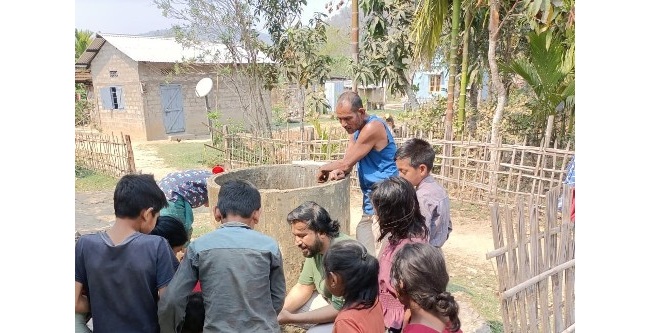Goal 6: Clean water and sanitation
Ensure availability and sustainable management of water and sanitation for all
Our research
The University’s interdisciplinary Clean Water and Sanitation Services research group, which includes academics and students, published a number of papers in 2023/24. Topics included the threat climate change poses to water security and water governance, with papers looking at community-based solutions, issues for small-town water utilities, and the effectiveness of climate-resilient water safety plans. Another paper examined the impact of non-sewered sanitation systems on greenhouse gas emissions.
A Bristol academic is leading efforts to tackle arsenic pollution in water supplies in the Global South, with a new study published in 2024. The researcher, inspired by his own experiences as a child in India, has helped uncover a way to make drinking water safer through oxidising the arsenic using local sources of iron. This opens the door to further work to decrease the harm cause by arsenic and to make drinking water safer in high-risk areas in southern and central Asia and South America.

Our students
A Bristol student was among attendees at the University Scholars Leadership Symposium in 2024. Organised by Humanitarian Affairs Asia, the event provided an opportunity for young leaders in their fields to share and inspire on global challenges. The student, who is studying for an MSc by research in Global Environmental Challenges at the University’s Cabot Institute and is looking at ways to tackle water-borne leptospirosis (or Weil’s disease), was able to join sessions on water, sanitation and hygiene, and visited a refugee camp near the border with Myanmar to see first-hand the sanitation challenges faced by the people there.
October 2024 saw the second year of our Science Partnerships Office’s Aegis Professor Undergraduate Competition, offering multidisciplinary teams of students a chance to share their innovative ideas and solutions to real-world challenges. 11 teams joined the final competition on Celebration Day, with four opting to look at the challenge theme of Clean Water for All. The overall winners, Team 9, developed an innovative filtration system to help reduce levels of arsenic in drinking water supplies in Bangladesh.
Our communities
A Bristol researcher was invited to present her work to Parliament in March 2024 as part of the STEM for BRITAIN initiative. Dr Sally Weston was one of 120 early career researchers presenting a poster at the event. She shared her work, which looks at water supply schedules and public health in Kenya, with other attending researchers, academics, and parliamentarians. The event was hosted by the UK Parliament’s Parliamentary and Scientific Committee as a way to bring the scientific community together with politicians and policymakers.
A public seminar on the topic of Governing Scarce Water Resources through Collaboration, held in the Wills Memorial Building in April 2024, saw the University joined by Dr Elizabeth Koebele of the University of Nevada in the US. Dr Koebele’s work is focused on environmental policy, with a particular interest in water governance and management in the western United States. The lecture was hosted by the Policy & Politics journal, of which Dr Koebele is a co-editor and which is published by Bristol University Press.
Ourselves
With the opening of the new, purpose-built Bristol Dental School building on Avon Street in late 2023 came new, state of the art dental training facilities. To help ensure the safety of staff, students, patients and visitors to the site, a water hygiene policy was developed and the university’s first Water Safety Group was established. Meeting quarterly, the Group is tasked with ensuring proactive water safety management, in order to prevent any outbreaks of water-based pathogens such as Legionella, which can be a risk with water-based dental equipment.
We are committed to reducing water consumption across the University and this is an essential part of our Sustainability Impact Assessments (SIAs). SIAs form part of business cases for any strategic projects or programmes, major capital projects, developing or revising faculties, divisional or university-wide policies, and prior to the procurement of significant supply or service contracts. They enable us to consider potential sustainability impacts at an early stage in the planning process. We have adapted the ‘Learn-Act-Measure’ model, also used in Equality Impact Assessment, and the framework focuses on three environmental aspects of sustainability: climate, nature, and resource use.
